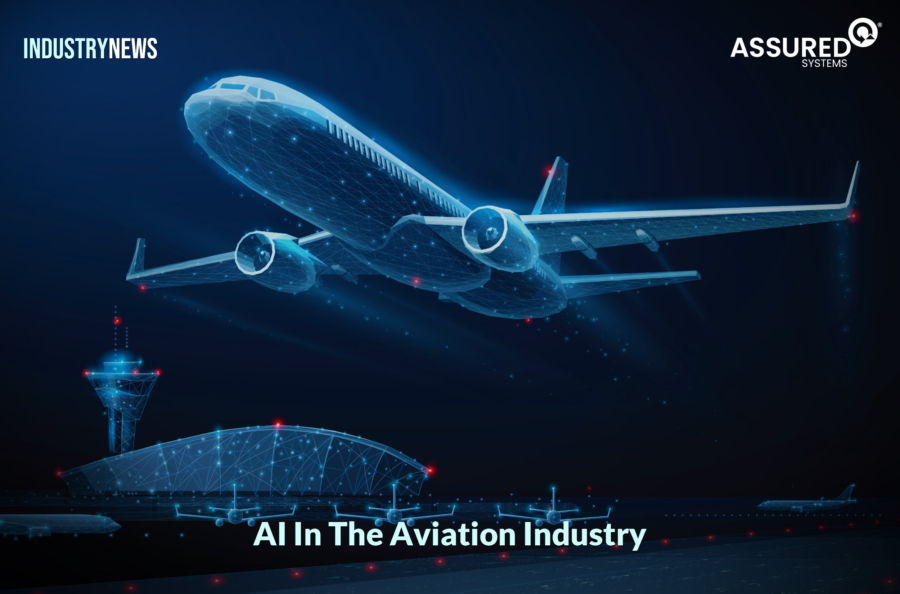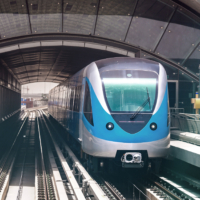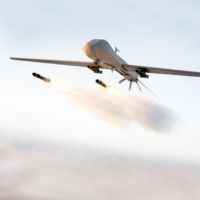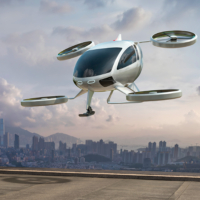In this article:
- INTRODUCTION
- How AI is Transforming Aviation
- AI Labs: Centres for AI Excellence in Aviation
- Enhancing Customer Experiences Through AI
- Predictive Maintenance and Route Optimisation
- Personalised Marketing
- Industry-Wide AI Adoption in Aviation
- The Future of AI in Aviation
- Transforming the Passenger Experience
- The Most Common Ways Artificial Intelligence is Transforming Aviation Operations
- Conclusion

INTRODUCTION
The aviation industry is undergoing a profound transformation as artificial intelligence (AI) technologies reshape operations, enhance customer experiences, and drive sustainable efficiencies. Although AI is widely recognised for its applications across tech-heavy industries, its influence in aviation is less recognised but rapidly growing. With increasing demand for faster, safer, and more sustainable air travel, AI innovations are set to revolutionize the industry, reshaping everything from maintenance and operations to customer interactions.
Many airlines are making a strategic decision to leverage AI innovations to boost customer satisfaction, improve operational efficiency, and support environmental goals. As AI continues to advance, its applications in aviation are expected to become even more diverse, helping airlines to navigate the complexities of a fast-evolving industry.
How AI is Transforming Aviation
While the global adoption of AI is evident in industries from finance to healthcare, the aviation sector is beginning to demonstrate AI’s potential to reshape its processes fundamentally. Airlines face growing pressure to reduce costs, increase safety, and minimise environmental impact. The integration of AI offers significant opportunities to address these challenges by optimising operational processes, enhancing customer engagement, and achieving ambitious sustainability targets.
Industry experts estimate that AI and analytics could create as much as USD 45 billion in value for airlines worldwide. With this potential in mind, many airlines are investing heavily in AI-driven capabilities to gain a competitive edge in an increasingly complex marketplace. This investment includes the establishment of dedicated AI labs designed to advance AI research and application within the aviation sector. By setting up these specialised centres, airlines are making a long-term commitment to innovation, ensuring that they remain at the forefront of technological progress.
AI Labs: Centres for AI Excellence in Aviation
To drive AI innovation, airlines have begun establishing these collaborative spaces where experts from various fields converge to develop and implement AI-powered solutions. These labs symbolise the industry’s commitment to future-forward thinking and are intended to produce tangible results that enhance operational efficiency and customer satisfaction.
These labs are often tasked with developing applications for real-time weather forecasting, which can improve the accuracy and safety of flight operations. Traditional methods rely on periodic weather updates, but AI-driven forecasting tools can analyse vast amounts of real-time data from multiple sources, offering pilots and ground crew the most current insights. This reduces flight disruptions caused by sudden weather changes and enables more efficient route planning, thereby directly benefiting passengers and improving punctuality.
Another promising area of development within AI labs, is traffic flow prediction. Using AI algorithms, these labs can analyse airport traffic data to predict congestion points and allocate resources more effectively. For example, during peak travel seasons, AI can help manage passenger flow, reduce bottlenecks, and ensure a smoother airport experience for travelers. This operational efficiency is vital as global air travel demand continues to rise, and airlines strive to meet passenger expectations.
Enhancing Customer Experiences Through AI
Customer service is a critical area where AI is making a significant impact in aviation. As passenger expectations evolve, airlines are using AI to redefine interactions and provide a seamless travel experience. For instance, AI-driven virtual assistants can handle routine inquiries, providing passengers with quick, accurate answers to questions about flight status, baggage tracking, and boarding times. By automating these routine tasks, AI-powered chatbots and virtual agents reduce wait times and free up customer service staff to handle more complex issues.
AI also enables airlines to offer a personalised experience throughout the customer journey. Machine learning algorithms analyse past interactions and preferences, allowing airlines to tailor services and promotions to individual passengers. For example, frequent business travelers might receive special offers for upgraded seating, while families with young children might be directed to family-friendly services. This level of personalisation enhances customer satisfaction and can drive revenue by encouraging repeat bookings and fostering loyalty.
Additionally, AI-driven language processing technologies enable airlines to offer multilingual support, further enhancing the experience for international travelers. This not only reduces language barriers but also makes information more accessible to a broader range of passengers, enhancing inclusivity and satisfaction.
Predictive Maintenance and Route Optimisation
Predictive maintenance is a game-changing area where AI provides significant cost savings and safety improvements. By analysing historical data and real-time sensor inputs from aircraft, AI algorithms can detect patterns and identify signs of potential mechanical issues before they escalate. This proactive approach allows airlines to schedule maintenance tasks before equipment fails, reducing the risk of unexpected delays and lowering repair costs. Furthermore, predictive maintenance contributes to passenger trust by enhancing the safety and reliability of flights.
In route optimisation, AI-driven algorithms consider variables like weather conditions, air traffic, fuel consumption, and potential delays to determine the most efficient route for each flight. By optimising flight paths, airlines can reduce fuel usage, decrease flight times, and cut down on emissions, contributing to cost savings and environmental sustainability. Given that global aviation accounts for a significant share of carbon emissions, AI’s role in route optimisation has far-reaching implications for reducing the industry’s environmental impact.
Some airlines are also exploring AI applications for air traffic control. By analysing vast datasets, AI can help manage complex air traffic networks, reducing congestion in busy airports and enhancing overall air traffic flow. This approach not only improves operational efficiency but also enhances safety by reducing the chances of air traffic collisions or miscommunications.
Personalised Marketing
Beyond operational efficiencies, AI is driving revenue growth through personalised marketing. Machine learning models can analyse passenger data to identify patterns in behavior and preferences, allowing airlines to create targeted marketing campaigns. By tailoring promotions to individual customers based on their interests and past interactions, airlines can increase conversion rates, foster loyalty, and maximise revenue per passenger.
For instance, AI might suggest travel destinations or vacation packages to passengers based on past booking history, browsing behavior, and seasonal trends. By delivering relevant content to passengers at the right time, airlines can encourage additional purchases and deepen customer relationships. This personalised marketing is expected to play a pivotal role in growth strategies across the aviation sector, allowing airlines to differentiate themselves in a crowded market and build a competitive advantage.
Some airlines are also using AI-driven sentiment analysis to understand customer feedback on social media platforms. By identifying trends and gauging passenger sentiment, they can make data-driven adjustments to improve services and better meet customer expectations. This not only enhances brand perception but also fosters loyalty by demonstrating a commitment to customer satisfaction.
Industry-Wide AI Adoption in Aviation
Across the globe, airlines are exploring ways to leverage AI to address key challenges, including reducing environmental impact, improving customer service, and enhancing operational efficiencies. For instance, airlines are implementing AI to optimise fuel efficiency, with real-time adjustments based on factors like weather conditions, air traffic, and other variables. This not only reduces operational costs but also aligns with the industry’s sustainability goals by cutting carbon emissions.
However, the widespread adoption of AI in aviation raises questions around data privacy and security. Airlines collect and process vast amounts of personal and operational data, so they must comply with stringent data protection regulations and implement robust security measures to safeguard passenger information. As AI-driven systems become more integrated into aviation, there is a growing need for industry-wide standards and ethical guidelines to ensure responsible AI use.
The Future of AI in Aviation
Looking ahead, airlines are expected to expand their commitment to AI as new technologies and methodologies emerge. The establishment of AI labs marks the beginning of what could be a transformative journey for the aviation industry. AI holds immense potential to improve operational performance, support employees, and contribute to long-term success.
Nonetheless, integrating AI into aviation is not without challenges. As AI systems become more sophisticated, airlines will need to invest in training their workforce to use and manage these technologies effectively. There are also concerns about job displacement, as some roles may be automated through AI applications. To address these issues, airlines are focusing on upskilling employees, ensuring that they have the knowledge and skills to work alongside AI systems.
Regulatory compliance presents another challenge. The aviation industry is highly regulated, and the introduction of AI adds complexity to existing frameworks. Governments and industry bodies will need to develop new guidelines to address unique challenges posed by AI, particularly in data security, algorithmic transparency, and ethical considerations. Ensuring that AI is used responsibly and transparently will be essential for building passenger trust and maintaining industry standards.
Transforming the Passenger Experience
One of the most promising areas of AI in aviation is its potential to transform the passenger experience. By personalising interactions and streamlining processes, AI can make air travel more convenient, enjoyable, and accessible for passengers. For example, some airlines are exploring AI-based systems to provide real-time updates on flight status, boarding times, and baggage tracking, offering passengers greater visibility and control over their journey.
AI can also enhance the airport experience by powering facial recognition technology to speed up security and boarding processes. This not only reduces wait times but also enhances the flow of passengers through airports. These innovations improve the passenger experience and enable airlines and airports to handle more passengers efficiently—an essential factor as global demand for air travel continues to grow.
The Most Common Ways Artificial Intelligence is Transforming Aviation Operations
In summary, AI has numerous applications in aviation, enhancing safety, efficiency, and the overall passenger experience:
- Flight Operations Optimisation with AI
- Route Optimisation: AI algorithms analyse live data on weather, air traffic, and fuel efficiency to suggest optimal flight paths, helping airlines save on fuel and cut down emissions.
- Fuel Management: AI systems predict precise fuel requirements, adjusting for payload and weather, improving fuel efficiency and operational costs.
- Autonomous Flight Control: AI enhances autopilot systems by assisting in maintaining altitude, speed, and course, with potential for future AI-driven autonomous aircraft for cargo transport.
- Predictive Maintenance for Enhanced Aircraft Safety
- Aircraft Health Monitoring: AI-powered health monitoring systems analyse real-time sensor data, predicting potential failures and reducing unexpected downtime.
- Fault Diagnosis and Repair: Machine learning models detect patterns in equipment failures, enabling airlines to address issues proactively, cutting costs, and enhancing reliability.
- AI-Powered Air Traffic Management
- Traffic Flow Optimization: AI helps air traffic controllers optimise the flow of aircraft, reducing delays and improving safety in busy airspaces.
- Collision Avoidance: AI-based systems predict potential collisions, dynamically adjusting aircraft trajectories to prevent in-air incidents.
- Improving Passenger Experience and Customer Service with AI
- Personalized Experience: AI tailors in-flight entertainment, food, and service recommendations to each passenger’s preferences.
- Chatbots and Virtual Assistants: AI-powered chatbots answer passenger questions, assist with booking, and provide flight updates, as seen with Emirates’ “Emilia” and Singapore Airlines’ “Kris.”
- Facial Recognition for Security and Check-in: AI-driven facial recognition speeds up check-in and boarding processes, improving security and convenience.
- AI in Baggage Handling and Tracking
- Automated Baggage Sorting: AI systems sort and handle baggage efficiently, reducing mishandling and lost luggage.
- Real-time Baggage Tracking: AI tracks baggage in real-time, offering passengers live updates and reducing instances of lost luggage.
- AI for Weather Forecasting and Hazard Detection
- Turbulence Prediction: AI analyses weather and flight data to forecast turbulence, allowing pilots to adjust routes for smoother flights.
- Hazard Detection: AI detects hazards like volcanic ash or bird risks, helping pilots avoid potentially dangerous situations.
- AI in Pilot Training and Simulation
- AI-Powered Simulators: AI enhances training simulators, creating realistic, adaptable scenarios to improve pilot readiness.
- Virtual Co-Pilots: AI systems act as virtual co-pilots in training, enhancing decision-making and response times in various flight conditions.
- AI for Supply Chain and Inventory Management
- Demand Forecasting: AI predicts demand for aircraft parts, ensuring a well-managed supply chain and minimizing delays in maintenance.
- Inventory Management: AI streamlines inventory processes, reducing costs and improving efficiency in parts management.
- Safety and Compliance Monitoring
- Behavioral Analytics: AI monitors crew behavior to identify signs of fatigue or stress, enhancing safety.
- Regulatory Compliance: AI scans documentation for compliance issues, helping airlines adhere to regulations efficiently.
- Environmental Impact Reduction
Conclusion
The adoption of AI in aviation is more than just a trend; it represents a strategic shift that is reshaping the future of air travel. By leveraging AI’s capabilities, the aviation industry is pioneering new ways to enhance efficiency, safety, and sustainability. From predictive maintenance and route optimisation to personalised marketing, AI is driving unprecedented improvements across the sector.
As AI technologies evolve, the possibilities for the aviation industry are boundless. With AI at the helm, airlines can look forward to a future where passenger satisfaction, operational efficiency, and environmental responsibility are seamlessly integrated. This is just the beginning of AI’s journey in aviation. As airlines continue to innovate and responsibly integrate AI, the industry is poised for a new era of smart, sustainable, and safe travel.










